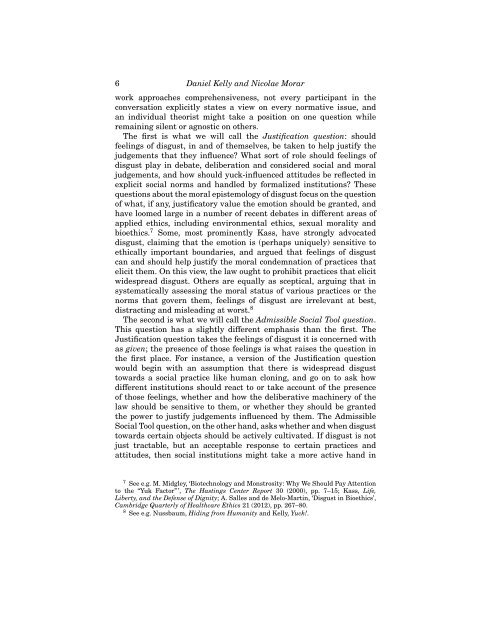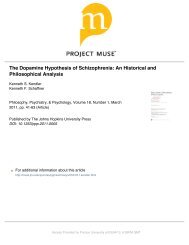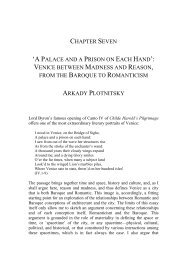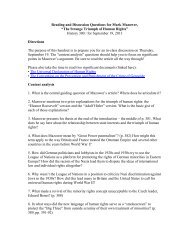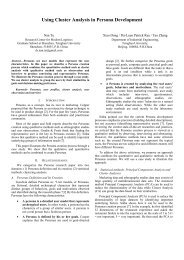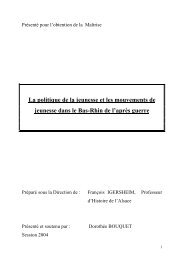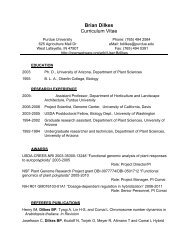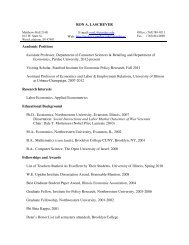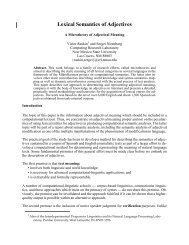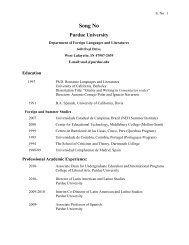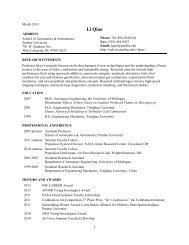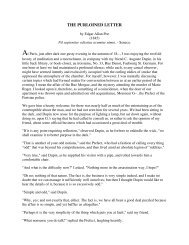Against the Yuck Factor - Career Account Web Pages - Purdue ...
Against the Yuck Factor - Career Account Web Pages - Purdue ...
Against the Yuck Factor - Career Account Web Pages - Purdue ...
Create successful ePaper yourself
Turn your PDF publications into a flip-book with our unique Google optimized e-Paper software.
6 Daniel Kelly and Nicolae Morar<br />
work approaches comprehensiveness, not every participant in <strong>the</strong><br />
conversation explicitly states a view on every normative issue, and<br />
an individual <strong>the</strong>orist might take a position on one question while<br />
remaining silent or agnostic on o<strong>the</strong>rs.<br />
The first is what we will call <strong>the</strong> Justification question: should<br />
feelings of disgust, in and of <strong>the</strong>mselves, be taken to help justify <strong>the</strong><br />
judgements that <strong>the</strong>y influence? What sort of role should feelings of<br />
disgust play in debate, deliberation and considered social and moral<br />
judgements, and how should yuck-influenced attitudes be reflected in<br />
explicit social norms and handled by formalized institutions? These<br />
questions about <strong>the</strong> moral epistemology of disgust focus on <strong>the</strong> question<br />
of what, if any, justificatory value <strong>the</strong> emotion should be granted, and<br />
have loomed large in a number of recent debates in different areas of<br />
applied ethics, including environmental ethics, sexual morality and<br />
bioethics. 7 Some, most prominently Kass, have strongly advocated<br />
disgust, claiming that <strong>the</strong> emotion is (perhaps uniquely) sensitive to<br />
ethically important boundaries, and argued that feelings of disgust<br />
can and should help justify <strong>the</strong> moral condemnation of practices that<br />
elicit <strong>the</strong>m. On this view, <strong>the</strong> law ought to prohibit practices that elicit<br />
widespread disgust. O<strong>the</strong>rs are equally as sceptical, arguing that in<br />
systematically assessing <strong>the</strong> moral status of various practices or <strong>the</strong><br />
norms that govern <strong>the</strong>m, feelings of disgust are irrelevant at best,<br />
distracting and misleading at worst. 8<br />
The second is what we will call <strong>the</strong> Admissible Social Tool question.<br />
This question has a slightly different emphasis than <strong>the</strong> first. The<br />
Justification question takes <strong>the</strong> feelings of disgust it is concerned with<br />
as given; <strong>the</strong>presenceofthosefeelingsiswhatraises<strong>the</strong>questionin<br />
<strong>the</strong> first place. For instance, a version of <strong>the</strong> Justification question<br />
would begin with an assumption that <strong>the</strong>re is widespread disgust<br />
towards a social practice like human cloning, and go on to ask how<br />
different institutions should react to or take account of <strong>the</strong> presence<br />
of those feelings, whe<strong>the</strong>r and how <strong>the</strong> deliberative machinery of <strong>the</strong><br />
law should be sensitive to <strong>the</strong>m, or whe<strong>the</strong>r <strong>the</strong>y should be granted<br />
<strong>the</strong> power to justify judgements influenced by <strong>the</strong>m. The Admissible<br />
Social Tool question, on <strong>the</strong> o<strong>the</strong>r hand, asks whe<strong>the</strong>r and when disgust<br />
towards certain objects should be actively cultivated. If disgust is not<br />
just tractable, but an acceptable response to certain practices and<br />
attitudes, <strong>the</strong>n social institutions might take a more active hand in<br />
7 See e.g. M. Midgley, ‘Biotechnology and Monstrosity: Why We Should Pay Attention<br />
to <strong>the</strong> “Yuk <strong>Factor</strong>” ’, The Hastings Center Report 30 (2000), pp. 7–15; Kass, Life,<br />
Liberty, and <strong>the</strong> Defense of Dignity; A. Salles and de Melo-Martin, ‘Disgust in Bioethics’,<br />
Cambridge Quarterly of Healthcare Ethics 21 (2012), pp. 267–80.<br />
8 See e.g. Nussbaum, Hiding from Humanity and Kelly, <strong>Yuck</strong>!.


